You are using an out of date browser. It may not display this or other websites correctly.
You should upgrade or use an alternative browser.
You should upgrade or use an alternative browser.
Iranian Affairs
- Thread starter Rakan.SA
- Start date
Counter-Errorist
THINK TANK
Iran IRGC aerospace force chief Brigadier General Amir-Ali Hajizadeh: High-Speed Anti-Radiation ballistic Missile ( HARM, HARBM ),
HARBM extirpate THaad High Altitude Area Defense simulation.
canister launched Hot vent ballistic missile, buried ballistic missile launched (NOT Silo),
Farm ballistic missile feiled,
IRGC The Great Prophet_14 drill,
HARBM extirpate THaad High Altitude Area Defense simulation.
canister launched Hot vent ballistic missile, buried ballistic missile launched (NOT Silo),
Farm ballistic missile feiled,
IRGC The Great Prophet_14 drill,
Counter-Errorist
THINK TANK
Coronavirus: Iran cover-up of deaths revealed by data leak
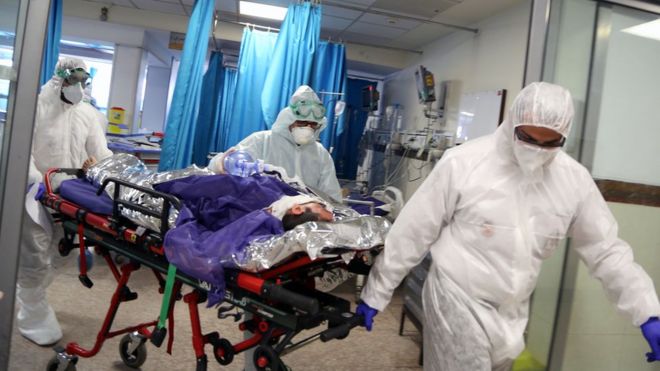
GETTY IMAGES Iran has been the worst-affected country in the Middle East
The number of deaths from coronavirus in Iran is nearly triple what Iran's government claims, a BBC Persian service investigation has found.
The government's own records appear to show almost 42,000 people died with Covid-19 symptoms up to 20 July, versus 14,405 reported by its health ministry.
The number of people known to be infected is also almost double official figures: 451,024 as opposed to 278,827.
The official numbers still make Iran the worst-hit in the Middle East.
In recent weeks, it has suffered a second steep rise in the number of cases.
The first death in Iran from Covid-19 was recorded on 22 January, according to lists and medical records that have been passed to the BBC. This was almost a month before the first official case of coronavirus was reported there.
Daily number of deaths from Covid-19 in Iran
Official figures vs uncovered data, 22 January to 20 July 2020
Source: BBC research
Since the outbreak of the virus in Iran, many observers have doubted the official numbers.
There have been irregularities in data between national and regional levels, which some local authorities have spoken out about, and statisticians have tried to give alternative estimates..
A level of undercounting, largely due to testing capacity, is seen across the world, but the information leaked to the BBC reveals Iranian authorities have reported significantly lower daily numbers despite having a record of all deaths - suggesting they were deliberately suppressed.
Where did the data come from?
The data was sent to the BBC by an anonymous source.
It includes details of daily admissions to hospitals across Iran, including names, age, gender, symptoms, date and length of periods spent in hospital, and underlying conditions patients might have.
The details on lists correspond to those of some living and deceased patients already known to the BBC.
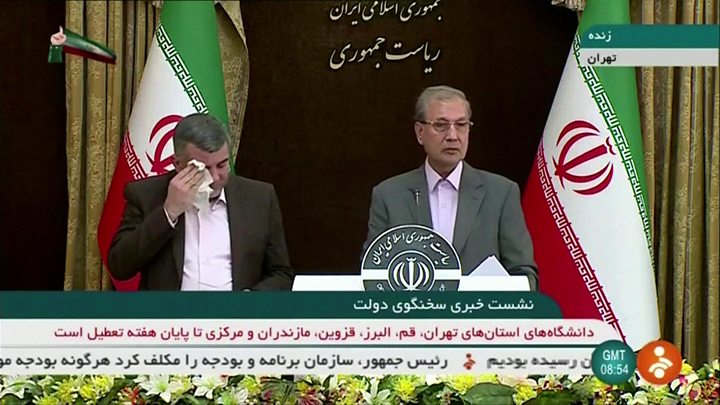
Iran's deputy health minister gets coronavirus
The source says they have shared this data with the BBC to "shed light on truth" and to end "political games" over the epidemic.
The discrepancy between the official figures and the number of deaths on these records also matches the difference between the official figure and calculations of excess mortality until mid-June.
Excess mortality refers to the number of deaths above and beyond what would be expected under "normal" conditions.
What does the data reveal?
Tehran, the capital, has the highest number of deaths with 8,120 people who died with Covid-19 or symptoms similar to it.
The city of Qom, the initial epicentre of the virus in Iran, is worst hit proportionally, with 1,419 deaths - that is one death with Covid-19 for every 1,000 people.
It is notable that, across the country, 1,916 deaths were non-Iranian nationals. This indicates a disproportionate number of deaths amongst migrants and refugees, who are mostly from neighbouring Afghanistan.
The overall trend of cases and deaths in the leaked data is similar to official reports, albeit different in size.
The initial rise of deaths is far steeper than Health Ministry figures and by mid-March it was five times the official figure.
Lockdown measures were imposed over the Nowruz (Iranian New Year) holidays at the end of the third week in March, and there was a corresponding decline in cases and deaths.
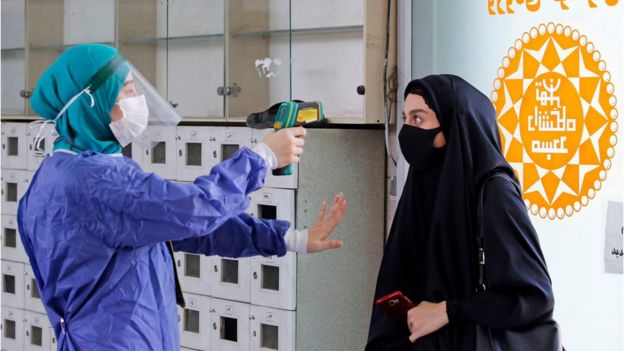
Iran has introduced measures to try to curb the spread of coronavirus
But as government restrictions were relaxed, the cases and deaths started to rise again after late-May.
Crucially the first recorded death on the leaked list occurred on 22 January, a month before the first case of coronavirus was officially reported in Iran.
At the time Health Ministry officials were adamant in acknowledging not a single case of coronavirus in the country, despite reports by journalists inside Iran, and warnings from various medical professionals.
In 28 days until the first official acknowledgement on 19 February, 52 people had already died.
Who were the first whistleblowers?
Doctors with direct knowledge of the matter have told the BBC that the Iranian health ministry has been under pressure from security and intelligence bodies inside Iran.
Dr Pouladi (not their real name) told the BBC that the ministry "was in denial".
"Initially they did not have testing kits and when they got them, they weren't used widely enough. The position of the security services was not to admit to the existence of coronavirus in Iran," Dr Pouladi said.
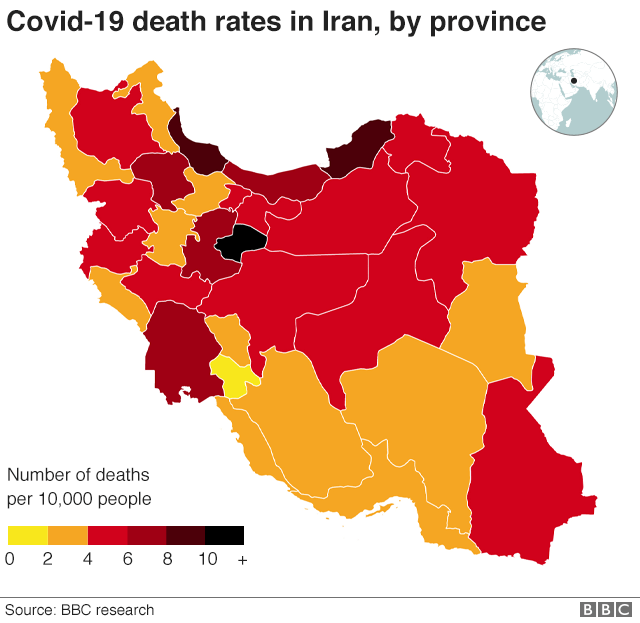
It was the persistence of two brothers, both doctors from Qom, which forced the health ministry to acknowledge the first official case.
When Dr Mohammad Molayi and Dr Ali Molayi lost their brother, they insisted he should still be tested for Covid-19, which turned out to be positive.
In Kamkar hospital, where their brother died, numerous patients were admitted with similar symptoms to Covid-19, and they would not respond to the usual treatments. Nevertheless, none of them were tested for the disease.
Dr Pouladi says: "They got unlucky. Someone with both decency and influence lost his brother. Dr Molayi had access to these gentlemen [health ministry officials] and did not give up."
Dr Molayi released a video of his late brother with a statement. The health ministry then finally acknowledged the first recorded case.
Nevertheless state TV ran a report criticising him and falsely claiming the video of his brother was months old.
Why the cover-up?
The start of outbreak coincided both with the anniversary of the 1979 Islamic Revolution and with parliamentary elections.
These were major opportunities for the Islamic Republic to demonstrate its popular support and not risk damaging it because of the virus.
Ayatollah Ali Khamenei, the Supreme Leader, accused some of wanting to use the coronavirus to undermine the election.
In the event, the election had a very low turnout.
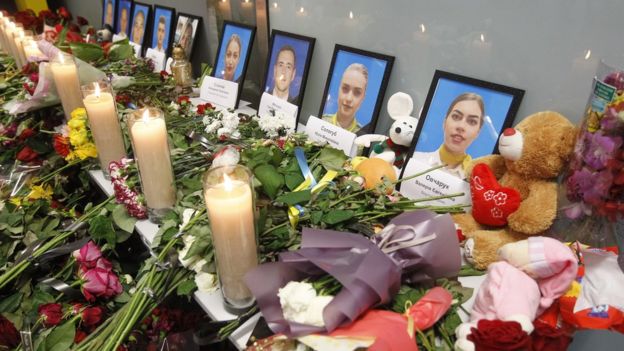
Iran's cover-up after it shot down a Ukrainian airliner fuelled anti-government protests
Before the global coronavirus pandemic hit, Iran was already experiencing a series of its own crises.
In November 2019, the government increased the price of petrol overnight and cracked down violently on protests which followed. Hundreds of protesters were killed in a few days.
In January this year, the Iranian response to the US assassination of top Iranian general Qasem Soleimani, seen as one of the most powerful figures in Iran after its Supreme Leader, created another problem.
Then Iranian armed forces - on high alert - mistakenly fired missiles at a Ukrainian airliner only minutes after it had taken off from Tehran's international airport. All 176 people on board were killed.
The Iranian authorities initially tried to cover up what happened, but after three days they were forced to admit it, resulting in considerable loss of face.
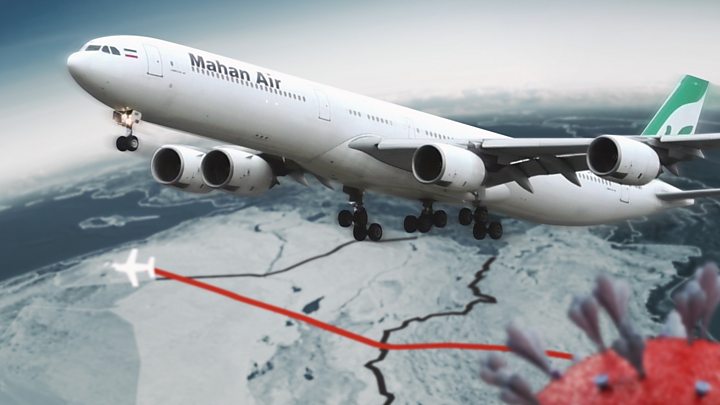
Flight tracking data and open source footage shows how Mahan Air continued to fly
Dr Nouroldin Pirmoazzen, a former MP who also was an official at the health ministry, told the BBC that in this context, the Iranian government was "anxious and fearful of the truth" when coronavirus hit Iran.
He said: "The government was afraid that the poor and the unemployed would take to the streets."
Dr Pirmoazzen points to the fact that Iran stopped international health organisation Médecins Sans Frontières from treating coronavirus cases in the central province of Isfahan as evidence of how security-conscious its approach towards the pandemic is.
Iran was going through tough times even before the military showdown with the US and coronavirus hit.
The sanctions which followed Donald Trump's withdrawal from the nuclear deal in May 2018 hit the economy hard.
Dr Pouladi says: "Those who brought the country to this point don't pay the price. It is the poor people of the country and my poor patients who pay the price with their lives."
"In the confrontation between the governments of the US and Iran we are getting crushed with pressures from both sides."
The health ministry has said that the country's reports to the World Health Organization regarding the number of coronavirus cases and deaths are "transparent" and "far from any deviations".
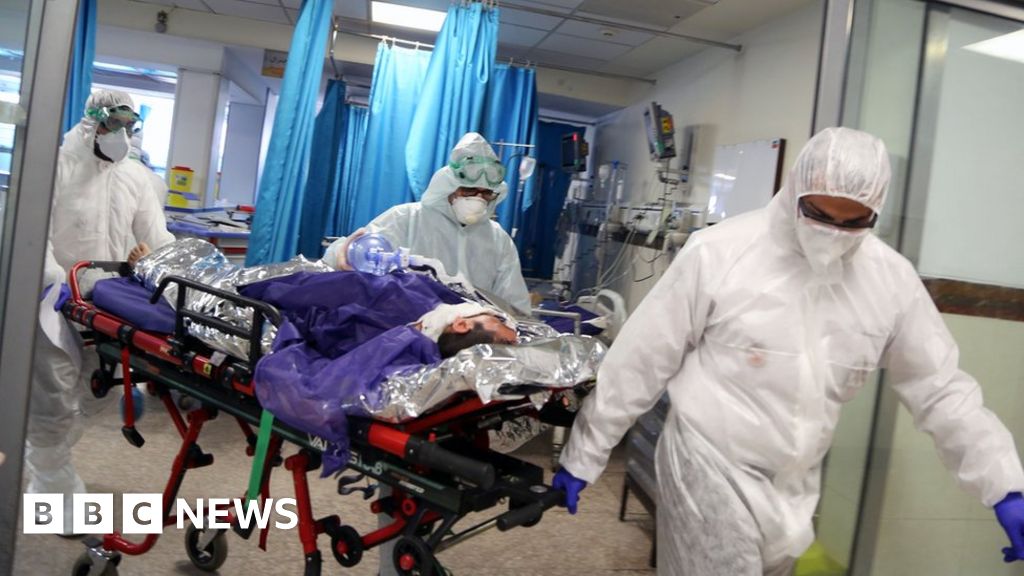
 www.bbc.com
www.bbc.com

GETTY IMAGES Iran has been the worst-affected country in the Middle East
The number of deaths from coronavirus in Iran is nearly triple what Iran's government claims, a BBC Persian service investigation has found.
The government's own records appear to show almost 42,000 people died with Covid-19 symptoms up to 20 July, versus 14,405 reported by its health ministry.
The number of people known to be infected is also almost double official figures: 451,024 as opposed to 278,827.
The official numbers still make Iran the worst-hit in the Middle East.
In recent weeks, it has suffered a second steep rise in the number of cases.
The first death in Iran from Covid-19 was recorded on 22 January, according to lists and medical records that have been passed to the BBC. This was almost a month before the first official case of coronavirus was reported there.
Daily number of deaths from Covid-19 in Iran
Official figures vs uncovered data, 22 January to 20 July 2020
Source: BBC research
Since the outbreak of the virus in Iran, many observers have doubted the official numbers.
There have been irregularities in data between national and regional levels, which some local authorities have spoken out about, and statisticians have tried to give alternative estimates..
A level of undercounting, largely due to testing capacity, is seen across the world, but the information leaked to the BBC reveals Iranian authorities have reported significantly lower daily numbers despite having a record of all deaths - suggesting they were deliberately suppressed.
Where did the data come from?
The data was sent to the BBC by an anonymous source.
It includes details of daily admissions to hospitals across Iran, including names, age, gender, symptoms, date and length of periods spent in hospital, and underlying conditions patients might have.
The details on lists correspond to those of some living and deceased patients already known to the BBC.

Iran's deputy health minister gets coronavirus
The source says they have shared this data with the BBC to "shed light on truth" and to end "political games" over the epidemic.
The discrepancy between the official figures and the number of deaths on these records also matches the difference between the official figure and calculations of excess mortality until mid-June.
Excess mortality refers to the number of deaths above and beyond what would be expected under "normal" conditions.
What does the data reveal?
Tehran, the capital, has the highest number of deaths with 8,120 people who died with Covid-19 or symptoms similar to it.
The city of Qom, the initial epicentre of the virus in Iran, is worst hit proportionally, with 1,419 deaths - that is one death with Covid-19 for every 1,000 people.
It is notable that, across the country, 1,916 deaths were non-Iranian nationals. This indicates a disproportionate number of deaths amongst migrants and refugees, who are mostly from neighbouring Afghanistan.
The overall trend of cases and deaths in the leaked data is similar to official reports, albeit different in size.
The initial rise of deaths is far steeper than Health Ministry figures and by mid-March it was five times the official figure.
Lockdown measures were imposed over the Nowruz (Iranian New Year) holidays at the end of the third week in March, and there was a corresponding decline in cases and deaths.

Iran has introduced measures to try to curb the spread of coronavirus
But as government restrictions were relaxed, the cases and deaths started to rise again after late-May.
Crucially the first recorded death on the leaked list occurred on 22 January, a month before the first case of coronavirus was officially reported in Iran.
At the time Health Ministry officials were adamant in acknowledging not a single case of coronavirus in the country, despite reports by journalists inside Iran, and warnings from various medical professionals.
In 28 days until the first official acknowledgement on 19 February, 52 people had already died.
Who were the first whistleblowers?
Doctors with direct knowledge of the matter have told the BBC that the Iranian health ministry has been under pressure from security and intelligence bodies inside Iran.
Dr Pouladi (not their real name) told the BBC that the ministry "was in denial".
"Initially they did not have testing kits and when they got them, they weren't used widely enough. The position of the security services was not to admit to the existence of coronavirus in Iran," Dr Pouladi said.

It was the persistence of two brothers, both doctors from Qom, which forced the health ministry to acknowledge the first official case.
When Dr Mohammad Molayi and Dr Ali Molayi lost their brother, they insisted he should still be tested for Covid-19, which turned out to be positive.
In Kamkar hospital, where their brother died, numerous patients were admitted with similar symptoms to Covid-19, and they would not respond to the usual treatments. Nevertheless, none of them were tested for the disease.
Dr Pouladi says: "They got unlucky. Someone with both decency and influence lost his brother. Dr Molayi had access to these gentlemen [health ministry officials] and did not give up."
Dr Molayi released a video of his late brother with a statement. The health ministry then finally acknowledged the first recorded case.
Nevertheless state TV ran a report criticising him and falsely claiming the video of his brother was months old.
Why the cover-up?
The start of outbreak coincided both with the anniversary of the 1979 Islamic Revolution and with parliamentary elections.
These were major opportunities for the Islamic Republic to demonstrate its popular support and not risk damaging it because of the virus.
Ayatollah Ali Khamenei, the Supreme Leader, accused some of wanting to use the coronavirus to undermine the election.
In the event, the election had a very low turnout.

Iran's cover-up after it shot down a Ukrainian airliner fuelled anti-government protests
Before the global coronavirus pandemic hit, Iran was already experiencing a series of its own crises.
In November 2019, the government increased the price of petrol overnight and cracked down violently on protests which followed. Hundreds of protesters were killed in a few days.
In January this year, the Iranian response to the US assassination of top Iranian general Qasem Soleimani, seen as one of the most powerful figures in Iran after its Supreme Leader, created another problem.
Then Iranian armed forces - on high alert - mistakenly fired missiles at a Ukrainian airliner only minutes after it had taken off from Tehran's international airport. All 176 people on board were killed.
The Iranian authorities initially tried to cover up what happened, but after three days they were forced to admit it, resulting in considerable loss of face.

Flight tracking data and open source footage shows how Mahan Air continued to fly
Dr Nouroldin Pirmoazzen, a former MP who also was an official at the health ministry, told the BBC that in this context, the Iranian government was "anxious and fearful of the truth" when coronavirus hit Iran.
He said: "The government was afraid that the poor and the unemployed would take to the streets."
Dr Pirmoazzen points to the fact that Iran stopped international health organisation Médecins Sans Frontières from treating coronavirus cases in the central province of Isfahan as evidence of how security-conscious its approach towards the pandemic is.
Iran was going through tough times even before the military showdown with the US and coronavirus hit.
The sanctions which followed Donald Trump's withdrawal from the nuclear deal in May 2018 hit the economy hard.
Dr Pouladi says: "Those who brought the country to this point don't pay the price. It is the poor people of the country and my poor patients who pay the price with their lives."
"In the confrontation between the governments of the US and Iran we are getting crushed with pressures from both sides."
The health ministry has said that the country's reports to the World Health Organization regarding the number of coronavirus cases and deaths are "transparent" and "far from any deviations".

Coronavirus: Iran cover-up of deaths revealed by data leak
Nearly three times more people died than Iran's government admitted, records seen by the BBC show.
Iran says European insurers should pay compensation for downed Ukrainian plane
August 10, 2020 / 2:28 PM / Updated 13 hours ago
Iran will not compensate Ukraine International Airlines for its plane Tehran accidentally downed in January because the passenger jet was insured by European firms, the head of Iran’s Central Insurance Organisation said on Monday.
“The Ukrainian plane is insured by European companies in Ukraine and not by Iranian (insurance) companies,” said Gholamreza Soleimani, according to the Young Journalists Club news website affiliated with state TV. “Therefore, compensation should be paid by those European companies.”
Iran’s elite Revolutionary Guards shot down the Ukraine International Airlines flight with a ground-to-air missile on Jan. 8 just after the plane took off from Tehran, in what Tehran later acknowledged as a “disastrous mistake” by forces who were on high alert during a confrontation with the United States.
Soleimani’s comments concerned the aircraft and did not address potential compensation for victims’ families. There was no immediate comment from European aviation insurers.
President Volodymyr Zelenskiy said in February that Ukraine was not satisfied with the size of compensation Iran had offered to families of Ukrainians killed in the incident. Ukrainian officials have said that Ukraine would make every effort to maximise the amount of restitution.
Last month, Iranian and Ukrainian officials held talks on the compensation, with another round set for October.
In a July report, Iran’s Civil Aviation Organisation blamed a chain of mistakes - such as a misalignment of a radar system and lack of communication between the air defence operator and his commanders - for the plane crash that killed 176 aboard, including 57 Canadians.
The downing occurred at a time of high tension between longtime foes Iran and the United States.
Iran was on alert for attacks after it fired missiles at Iraqi bases housing U.S. forces in retaliation for the killing on Jan. 3 of its most powerful military commander, Qassem Soleimani, in a U.S. missile strike at Baghdad airport.
Writing by Parisa Hafezi; Editing by Mark Heinrich
August 10, 2020 / 2:28 PM / Updated 13 hours ago
Iran will not compensate Ukraine International Airlines for its plane Tehran accidentally downed in January because the passenger jet was insured by European firms, the head of Iran’s Central Insurance Organisation said on Monday.
“The Ukrainian plane is insured by European companies in Ukraine and not by Iranian (insurance) companies,” said Gholamreza Soleimani, according to the Young Journalists Club news website affiliated with state TV. “Therefore, compensation should be paid by those European companies.”
Iran’s elite Revolutionary Guards shot down the Ukraine International Airlines flight with a ground-to-air missile on Jan. 8 just after the plane took off from Tehran, in what Tehran later acknowledged as a “disastrous mistake” by forces who were on high alert during a confrontation with the United States.
Soleimani’s comments concerned the aircraft and did not address potential compensation for victims’ families. There was no immediate comment from European aviation insurers.
President Volodymyr Zelenskiy said in February that Ukraine was not satisfied with the size of compensation Iran had offered to families of Ukrainians killed in the incident. Ukrainian officials have said that Ukraine would make every effort to maximise the amount of restitution.
Last month, Iranian and Ukrainian officials held talks on the compensation, with another round set for October.
In a July report, Iran’s Civil Aviation Organisation blamed a chain of mistakes - such as a misalignment of a radar system and lack of communication between the air defence operator and his commanders - for the plane crash that killed 176 aboard, including 57 Canadians.
The downing occurred at a time of high tension between longtime foes Iran and the United States.
Iran was on alert for attacks after it fired missiles at Iraqi bases housing U.S. forces in retaliation for the killing on Jan. 3 of its most powerful military commander, Qassem Soleimani, in a U.S. missile strike at Baghdad airport.
Writing by Parisa Hafezi; Editing by Mark Heinrich
U.S invoke regulation mechanism in UNSC-2231 paragraph-10 'snapback' restoration all of United Nations sanctions on Iran Secretary of State Mike Pompeo delivered the notification to the president of the UN Security Council, setting the stage for a showdown in the world body that could lead to a crisis of credibility for its most important and powerful institution. Speaking to reporters at the UN, after delivering the letter Pompeo said the US had the right to reimpose sanctions under UN resolution 2231 that laid out the rules of the deal.
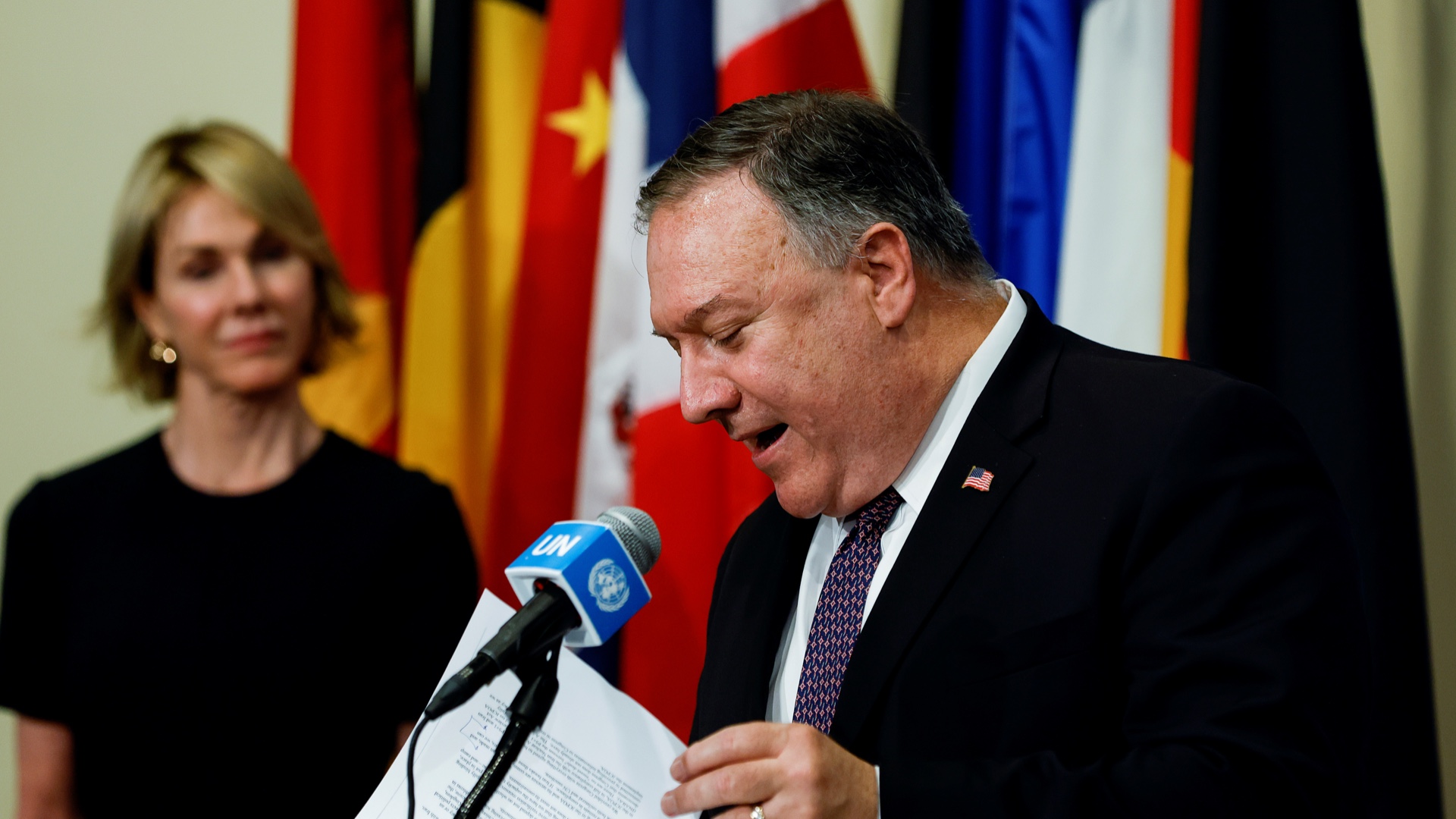
US demands restoration of UN sanctions against Iran
Tehran and European governments reject US call for a ‘snapback’ of international sanctions.
U.N council rejects U.S. demand to 'snap back' Iran sanctions The Indonesia president of the UN Security Council Dian Triansyah Djani, rejected the Trump administration’s demand to restore all U.N. sanctions on Iran, a move that drew an angry rebuke from the U.S. ambassador who accused opponents of supporting “terrorists."
UN Council Rejects US Demand to 'Snap Back' Iran Sanctions
The president of the U.N. Security Council on Tuesday rejected the Trump administration’s demand to restore all U.N. sanctions on Iran, a move that drew an angry rebuke from the U.S. ambassador who accused opponents of supporting “terrorists.”
Iran Army Zulfiqar-99 Joint military Exercise in Indian Ocean and Makran Sea (Oman Sea)
Nasr fired surface-to-surface anti-ship cruise missiles from naval vessel,
Firing Qader anti-ship cruise missiles / destroying a target at a distance of 200 km
participation Fateh submarine
Destruction of ground targets by Army Air Force fighters
Sub-surface anti-ship cruise missiles from Ghadir submarine
Three American planes were intercepted by Karar drone
Nasr fired surface-to-surface anti-ship cruise missiles from naval vessel,
Firing Qader anti-ship cruise missiles / destroying a target at a distance of 200 km
participation Fateh submarine
Destruction of ground targets by Army Air Force fighters
Sub-surface anti-ship cruise missiles from Ghadir submarine
Three American planes were intercepted by Karar drone
'Confronting Any Possible Invasions': Iran Launches Massive War Games Near Strait of Hormuz
10.09.2020©AP Photo / Iranian Army
According to the military, the manoeuvres involve the navy, air force and ground forces, including a domestically-made submarine, fighter jets and air defences.
Iran’s armed forces on Thursday began an annual large-scale three-day exercise in the Gulf of Oman, near the strategic Strait of Hormuz through which a large share of all oil traded passes.
The spokesman for the Zolfaghar-99 drills, Shahram Irani, said that Tehran had warned all foreign aircraft to leave the area of the exercise.
According to the official, US drones, which were allegedly collecting data there, have left the scene of the manoeuvres.
The day before, Adm. Habibollah Sayyari, the commander of the annual manoeuvre, said that the war game was aimed at "improving readiness in confronting foreign threats and any possible invasion".
During other drills with the participation of the elite Islamic Revolutionary Guard Corps (IRGC) in July, Iran test-fired what it calls a “buried” ballistic missile.
The drills come amid continuing tensions with Washington that have been escalating since the US unilaterally withdrew from the Joint Comprehensive Plan of Action (JCPOA) in 2018.
One of the biggest escalations this year took place in January after the US assassinated prominent Iranian general Qasem Soleimani and Tehran responded with a missile attack on American military bases in Iraq that left numerous servicemen injured but stopped short of leading to fatalities.
Iran reportedly considered assassinating a US ambassador as revenge for the killing of Qasem Soleimani
Sinéad Baker4 hours ago
US Ambassador to South Africa Lana Marks in Soweto, South Africa, in June 2020. Sharon Seretlo/Gallo Images via Getty Images
- US intelligence reports say that Iran has been thinking of assassinating Lana Marks, the US ambassador to South Africa, as revenge for killing of top general Qassem Soleimani in January, Politico reported.
- The US killed Soleimani in a drone strike that majorly escalated tensions between the two countries and pushed them close to war.
- Iran then vowed revenge, and launched ballistic missiles at US forces in Iraq in the days after Soleimani's death.
- Marks' decades-long relationship to Trump may have been a factor behind the threats against her, Politico reported. She has been made aware of the threat, the report said.
US intelligence has been aware of the threats against Lana Marks since the spring, but found that the threats had become more "specific" in recent weeks, the report said.
Marks was nominated to the role by President Donald Trump in 2018 and was sworn in last October.
A US government official who spoke to Politico said that Marks has been aware of the threat as part of intelligence community protocol, and that Iran's embassy in Pretoria, South Africa, is involved in the plot against her.
The intelligence was also included in the CIA's classified World Intelligence Review, which reaches security officials, according to Politico.
An Iranian holds a photograph of Qassem Soleimani in Tehran after the general's assassination - Reuters
Why Marks?
Politico reported that the intelligence community remains unsure as to why Iran had focused on Marks.However, the government official told the outlet that Marks' relationship with Trump may have been a factor as to why she was singled out as a target.
Marks was a handbag designer and a member of his Mar-a-Lago club before she was selected as ambassador, and has known Trump for more than two decades, Politico reported.
Iran's network of operatives in South Africa may also have been a factor in selecting Marks, Politico reported.
The State Department, CIA, and Office of the Director of National Intelligence all declined to comment to Politico.
The National Security Council, Iran's mission at the United Nations, and South African Embassy in Washington, DC did not respond to Politico's requests for comment.
Iran vowed revenge
Soleimani, who led Iran's Revolutionary Guard Corps, was killed by a US drone strike in Baghdad, Iraq, on January 3, 2020.He was revered by many in Iran, and his death pushed the US and Iran close to war earlier this year.
Iran vowed revenge on the US after his death, with experts saying the country could target US diplomats as part of its retaliation.
Days after Soleimani's death, Iran launched ballistic missiles at US forces in Iraq, with the US later saying that more than 100 US service members were diagnosed with traumatic brain injuries after the attack.
Trump had justified the killing by claiming that Soleimani was an "imminent threat." But leaked US intelligence in the days after Soleimani's death suggested that those threats were exaggerated, or even nonexistent.
US allies like the UK and Germany had criticized the strike. And in July, the UN's top human rights investigator said the US broke international law by killing Soleimani.
The attack on Soleimani came after tensions had been rising between the two countries, and was considered a major escalation of their conflict.
Iran is considering assassinating the US ambassador to South Africa as revenge for top general Qassem Soleimani, report says
US intelligence said that Iran is considering killing US Ambassador to South Africa Lana Marks, according to Politico.
Iranian president accuses U.S. of savagery after new sanctions
Updated 2 hrs agoIranian President Hassan Rouhani accused the United States on Saturday of “savagery” for inflicting $150 billion of damage on Iran due to sanctions, and said Iranians should direct their anger at the White House.
“With their illegal and inhuman sanctions, and terrorist actions, the Americans have inflicted 150 billion dollars of damage on the people of Iran,” Rouhani said in televised remarks, his voice shaking with anger.
“We haven’t seen such an extent of savagery ... The address for Iranian people’s curses and hatred is the White House.”
Tensions between Washington and Tehran have soared since U.S. President Donald Trump unilaterally withdrew in 2018 from the Iran nuclear deal struck by his predecessor and began reimposing sanctions that had been eased under the accord.
Iran, in turn, has gradually breached the central limits in that deal, according to the International Atomic Energy Agency (IAEA), including on the size of its stockpile of low-enriched uranium as well as the level of purity to which it was allowed to enrich uranium.
Washington imposed new sanctions on Monday on Iran’s defence ministry and others involved in its nuclear and weapons programme.
On Thursday, Washington blacklisted several Iranian officials and entities over alleged gross violations of human rights, including imposing sanctions on a judge it said was involved in the case of an Iranian wrestler sentenced to death.
Rouhani gave no details on the breakdown of the economic damage he said had been incurred due to the sanctions.
Editing by Alison Williams
Revolutionary Guards Commander Gives Rare Estimate Of Money Iran Spent On Proxies, Military Aid In Region
September 30, 2020Ali Fadavi is the second most senior commander in Iran's Islamic Revolutionary Guards Corps. (file photo)
Iran has spent nearly $20 billion pushing its controversial foreign policy objectives in the region, the deputy commander of the Islamic Revolutionary Guards Corps (IRGC) said in an interview on state television.
Speaking to state TV channel Ofogh on September 26, Ali Fadavi said Iran had spent $19.6 billion on the 1980-1988 war with Iraq while adding that the cost for Iran's regional policies -- on such things as proxy armies and military aid in countries like Syria, Iraq, and Yemen -- was less than that.
He added he could not remember the precise amount.
But Fadavi, the second most senior commander in the IRGC, said those billions were insignificant compared to what Iran had gained in the region.
"From the beginning when we got involved in the [so-called] Resistance Front, how much do you think we spent? The numbers are very low, a lot less than the war but the results [have been significant]." he said.
The rare estimate on how much the IRGC spent supporting regimes and factions in nearby countries was far less than figures cited by other sources.
Lawmaker Heshmatollah Falahatpisheh, for example, was quoted by Iranian media in May as saying Iran might have spent between $20 billion and $30 billion just on its involvement in Syria where Iranian-backed forces and militia have propped up the government of Syrian President Bashar al-Assad.
It's not possible to verify such figures due to the secrecy of most IRGC expenditures and because Iran does not reveal the cost of its support for regional proxies aimed at expanding its influence in the region and countering its rival, Saudi Arabia.
'Think Of Us'
Iran's support for those paramilitaries, including the Lebanese Hizballah, has been a source of anger for some Iranians particularly when economic mismanagement and crippling U.S. sanctions have led to the free fall of the national currency and skyrocketing prices that make life extremely difficult for many people.
During recent antiestablishment demonstrations, protesters chanted "Leave Syria, think of us," and "No to Gaza, no to Lebanon, I sacrifice my life for Iran." The chants highlight the frustration people have with Iran's support for those regional armies and the aid it provides to Syria.
Iran's use of proxies has also been a talking point by the administration of U.S. President Donald Trump against the clerical establishment, accusing Tehran of stealing resources from the Iranian people to create instability in the Middle East and support terrorist groups.
The U.S. State Department said in 2018 that the Iranian establishment has spent "$16 billion propping up the Assad regime and supporting its other partners and proxies in Syria, Iraq, and Yemen since 2012."
The report also said Iran funds Hizballah to the tune of $700 million annually and gives a further $100 million a year to Palestinian groups such as Hamas and Islamic Jihad.
When Fadavi was asked about the chants of protesters against Tehran giving such aid to countries in the region, he appeared to suggest that they're unimportant in the face of what he described as the "victories and greatness" Iran has achieved through its policies being implemented.
Iranian General Rahim Yahya Safavi (file photo)
In separate comments, General Rahim Yahya Safavi, a military adviser to Supreme Leader Ayatollah Ali Khamenei, who served as IRGC commander, said Iran will support any "Muslim or non-Muslim country" that will ask for its help, adding: "but we will take money from them."
Iranian officials have suggested that despite Washington's campaign of "maximum pressure," which has brought unprecedented problems to the Iranian economy, they are not ready to give up their support for proxies.
Gold For Fuel
The IRGC's external Quds force, whose chief Qasem Soleimani was killed in a U.S. drone attack in January, is believed to have played a major role in expanding Iran's regional operations.
"For every assistance we provided to the Iraqis we received dollars in cash," Safavi said in a September 27 interview with the semiofficial Mehr news agency. "We signed a contract with the Syrians in exchange for certain things, of course the Russians will [benefit] in Syria more than us."
He also confirmed earlier media reports that Tehran had received gold for sending fuel to Venezuela, which has also been targeted by U.S. sanctions.
"We gave gasoline to Venezuela and received gold bars [in payment]. We brought the gold to Iran in a plane so that nothing would happen to it," Safavi said.
IAEA Inspects Second Suspected Nuclear Site In Iran
September 30, 2020In late August, Iran announced it would allow the IAEA access to two sites following a visit to Tehran by IAEA Director-General Rafael Grossi (pictured).
The UN's nuclear watchdog says it has gained access to a second site in Iran where nuclear activities are suspected to have taken place in the past, as agreed with Tehran last month.
"As part of an agreement with Iran to resolve safeguards implementation issues specified by the IAEA, the agency this week conducted a complementary access at the second location in the country and took environmental samples," the International Atomic Energy Agency (IAEA) said in a statement on September 30.
In late August, Iran announced it would allow the IAEA access to two sites following a visit to Tehran by IAEA Director-General Rafael Grossi, ending a standoff between Tehran and the Vienna-based global watchdog.
After the first site was visited by inspectors in early September, Grossi said that analyzing samples collected there would take "no less than a couple of months, two or three months maybe.”
The IAEA has criticized Iranian officials for denying it access to the two locations, and for not answering its questions about possible undeclared nuclear material and nuclear-related activities there during the early 2000s.
In June, the IAEA's board of governors passed a rare resolution demanding that Iran "fully cooperate" and "satisfy the agency's requests without any further delay," including by providing "prompt" access to the sites in question.
Iran argued the UN agency had no legal basis to inspect the sites.
The row had threatened to put yet more strain on a landmark 2015 nuclear deal between Iran and world powers, after the United States withdrew from the agreement in 2018 and reimposed sanctions on Iran.
Under the deal, Iran pledged to curb its nuclear ambitions in exchange for sanctions relief.
